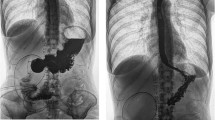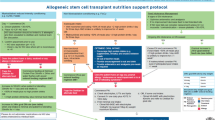Abstract
A restricted oral diet plays a significant role in the nutritional management of patients with Short Bowel Syndrome (SBS). SBS patients often experience increased intestinal output, especially if they are classified as net “secretors” (typically having less than 100 cm of residual jejunum). This means they lose more water and sodium from their stoma than they take in by mouth. In this report, we present the case of an SBS patient with 80 cm of remaining bowel, no colon in continuity, and a high-output stoma. The patient was managed with a restrictive oral diet in combination with parenteral nutrition, pharmacological treatment, and high patient compliance. Following this regimen, the patient’s condition improved significantly, leading to a reduction in stoma output and an improvement in nutritional status, including stabilization and weight gain. Upon discharge from the hospital, the patient was maintaining an oral diet with specific nutritional recommendations and receiving parenteral saline. This case report suggests that the combined use of restricted oral intake and parenteral nutrition (PN), alongside appropriate pharmacological management and high patient compliance, can effectively manage high-output stomas and improve nutritional status, even in cases where the small bowel is less than 100 cm in length.
This is a preview of subscription content, access via your institution
Access options
Subscribe to this journal
Receive 12 print issues and online access
$259.00 per year
only $21.58 per issue
Buy this article
- Purchase on SpringerLink
- Instant access to the full article PDF.
USD 39.95
Prices may be subject to local taxes which are calculated during checkout

Similar content being viewed by others
References
Pironi L, Cuerda C, Jeppesen PB, Joly F, Jonkers C, Krznarić Ž, et al. ESPEN guideline on chronic intestinal failure in adults - Update 2023. Clin Nutr. 2023;42:1940–2021. https://doi.org/10.1016/j.clnu.2023.07.019
Lakananurak N, Wall E, Catron H, Delgado A, Greif S, Herlitz J, et al. Real-world management of high stool output in patients with short bowel syndrome: an international multicenter survey. Nutrients. 2023;15:2763. https://doi.org/10.3390/nu15122763
Sobocki J, Zaczek Z, Jurczak P, Lachowicz K, Kunecki M, Groszek P, et al. Restricted v. unrestricted oral intake in high output end-jejunostomy patients referred to reconstructive surgery. Br J Nutr. 2021;125:1125–31. https://doi.org/10.1017/S0007114520003360
Klek S, Forbes A, Gabe S, Holst M, Wanten G, Irtun Ø, et al. Management of acute intestinal failure: a position paper from the European Society for Clinical Nutrition and Metabolism (ESPEN) Special Interest Group. Clin Nutr. 2016;35:1209–18. https://doi.org/10.1016/j.clnu.2016.04.009
Nightingale J, Woodward JM. Small Bowel and nutrition committee of the British Society of Gastroenterology. Guidelines for management of patients with a short bowel. Gut. 2006;55:Suppl 4–iv12. https://doi.org/10.1136/gut.2006.091108
Nightingale JMD. How to manage a high-output stoma. Frontline Gastroenterol. 2022;13:140–51.
Szczygiel B, Jonkers-Schuitema CF, Naber T. Basics in Clinical Nutrition: Nutritional support in extensive gut resections (short bowel). EDUCATIONAL PAPER. 2010;1:e63–8.
Jeppesen PB. Teduglutide, a novel glucagon-like peptide 2 analog, in the treatment of patients with short bowel syndrome. Ther Adv Gastroenterol. 2012;5:159–71. https://doi.org/10.1177/1756283X11436318
Riutort MC, Alberti G, Gana JC, Villarroel del Pino LA, Cifuentes LI, Rivera-Cornejo M. Teduglutide for the treatment of patients with short bowel syndrome. Cochrane Database Syst Rev 2021; https://doi.org/10.1002/14651858.CD014216
Bouloubasi Z, Karayiannis D, Papadopoulou A, Dimitrokallis N, Tsanasa A, Karveli E, et al. Managing fluid balance and nutritional status in a short bowel syndrome patient awaiting intestinal transplant: a case report. Eur J Clin Nutr. 2024;78:455–8. https://doi.org/10.1038/s41430-024-01405-z
Iyer K, DiBaise JK, Rubio-Tapia A. AGA clinical practice update on management of short bowel syndrome: expert review. Clin Gastroenterol Hepatol. 2022;20:2185–2194.e2. https://doi.org/10.1016/j.cgh.2022.05.032
Roberts K, Shah ND, Parrish CR, Wall E. Navigating nutrition and hydration care in the adult patient with short bowel syndrome. Nutr Clin Pr. 2023;38:S59–75. https://doi.org/10.1002/ncp.10951
Author information
Authors and Affiliations
Contributions
AA, DK and DM contributed to the acquisition and analysis of clinical data, participated in the literature review, and played a significant role in drafting and revising the manuscript; PP, EP, AA, KC, PS and MD discussed and edited the manuscript. All authors have read and agreed to the final version of the manuscript.
Corresponding author
Ethics declarations
Competing interests
The authors declare no competing interests.
Additional information
Publisher’s note Springer Nature remains neutral with regard to jurisdictional claims in published maps and institutional affiliations.
Rights and permissions
Springer Nature or its licensor (e.g. a society or other partner) holds exclusive rights to this article under a publishing agreement with the author(s) or other rightsholder(s); author self-archiving of the accepted manuscript version of this article is solely governed by the terms of such publishing agreement and applicable law.
About this article
Cite this article
Almperti, A., Papanastasiou, P., Epithaniou, P. et al. Successful weaning from parenteral nutrition in a short bowel syndrome patient with high-output stoma through restricted oral diet: a case report. Eur J Clin Nutr 79, 83–86 (2025). https://doi.org/10.1038/s41430-024-01508-7
Received:
Revised:
Accepted:
Published:
Version of record:
Issue date:
DOI: https://doi.org/10.1038/s41430-024-01508-7



